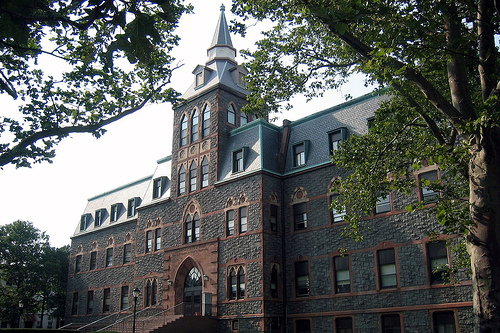Courses Preparation

Edwin A Stevens Hall hosts Civil and Environmental Engineering laboratories at Stevens Institute of Technology in Hoboken, NJ.
General
Environmental engineering is both interdisciplinary and exceedingly technical. Environmental engineers prepare for their profession with classes in chemistry, physics, engineering drafting, engineering principles, and math. But, depending on the specialty within the field that is chosen, courses in biology, geology, hydrology, geomorphology, and soil science can be elected. To design systems to protect and clean up the environment, engineers must also understand the mechanics of the atmosphere, lithosphere, and biosphere.
Many colleges and university academic programs emphasize the fact that training in the human dimension is as important as the natural sciences for environmental engineering careers. Course work emphasizes conservation, reuse, and pollution prevention to manage the environment. Political and economic issues are given consideration as well, because the reality is that political and economic conditions affect how environmental engineers go about solving the problems they face.
Carleton Courses
As you might have noticed, Carleton, an alleged liberal arts college, does not have an engineering curriculum. However, students commonly enter graduate engineering programs after completing their Carleton career. Technically, with the correct combination of courses taken, students from any major can be admitted into graduate engineering programs. However, students typically choose a science related major, such as physics, chemistry, geology, computer sciences, biology, mathematics, and environmental studies. As of 2009, most alumni in environmental engineering had a geology major. However, there are also alumni with chemistry, physics, or even english majors who identified themselves as environmental engineering.
Depending on the specific area you are interested in within environmental engineering, you might wish to become a physics, chemistry, geology, computer science, or biology major. For example, if you are interested in biological drinking water or wastewater treatments, then biology or chemistry major will suit you. If you are interested in using membrane technology to treat water instead, then a chemsitry or physics major will do. If you are into ground water hydrological modeling, then a geology or computer science major will likely be your focus. After discovering what areas of environmental engineering you are interested in, look into the courses description pages of departments that are outside your major. You might find the right course you want to take there instead. Besides, breadth in your course background is usually a plus due to the interdisciplinary nature of this field. Below is a very general list of Carleton courses that are helpful for applying to environmental engineering programs. Note that although most graduate schools do not specify a list of required courses for admission, check the websites of your desired schools to make sure.
Math –
Calculus sequence:
MATH 111: Introduction to Calculus (6 credits)
MATH 131: Inverses and Integration (3 credits)
MATH 141: Mathematical Modeling or MATH 151: Sequences and Series (3 credits)
MATH 211: Introduction to Multivariable Calculus (6 credits)
Applied math:
MATH 232: Linear Algebra (6 credits)
MATH 241: Ordinary Differential Equations (6 credits)
Statistics and Probability:
MATH 215: Introduction to Statistics (6 credits)
MATH 265: Probability (6 credits)
Physics –
Introduction series (Note: Carleton offers a variety of combination for Introduction to Physics series. For environmental engineering purpose, Newtonian Mechanics and Fluid and Waves will be more applicable. But you can take any of the combinations offered.):
PHYS 131: Newtonian Mechanics or PHYS 132: Gravity and the Earth or PHYS 141: Gravity and the Cosmos or PHYS 142: Matter and Interactions (3 credits)
PHYS 151: Relativity and Particles or PHYS 152: Environmental Physics or PHYS 153: Fluid and Waves (3 credits)
PHYS 161: Electricity, Magnetism & Circuits (3 credits)
PHYS 162: Light and Optics (3 credits)
Chemistry –
General chemistry:
CHEM 123: Principles of Chemistry or CHEM 128: Principles of Environmental Chemistry (6 credits)
CHEM 230: Equilibrium and Analysis (6 credits)
Computer Science:
Basic programming:
CS 111: Introduction to Computer Science (6 credits)
CS 201: Data Structures (6 credits)
Biology –
Introduction series:
BIOL 125: Genes, Evolution, and Development (6 credits)
BIOL 126: Energy Flow in Biological Systems (6 credits)
Geology –
Introduction:
GEOL 110: Introduction to Geology or GEOL 120: Introduction to Environmental Geology (6 credits)
Other additional courses
Sample Course Schedule
Additionally, Carleton's Advising Handbook also has specific advise and sample course schedules for students interested in engineering. The engineering adviser on campus is Nelson Christensen (nchriste@) in the Physics department. Talk to him as early as possible to help planning out your course schedule. There are other professors with engineering backgrounds on campus, including Amy Csizmar Dalal (adalal@) in the CS department. You might wish to contact them for general engineering graduate school advises.